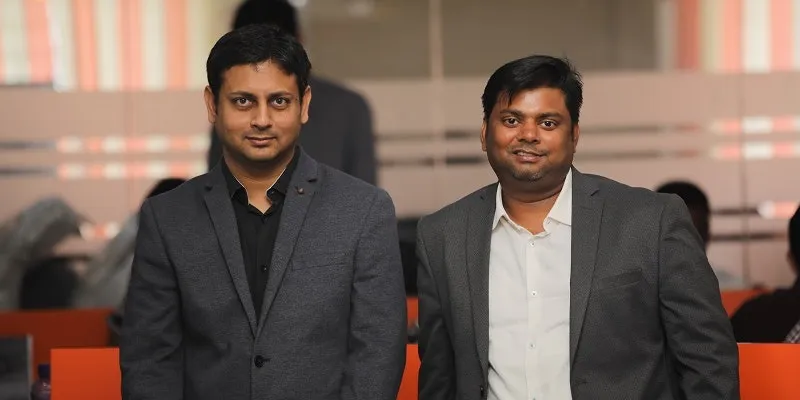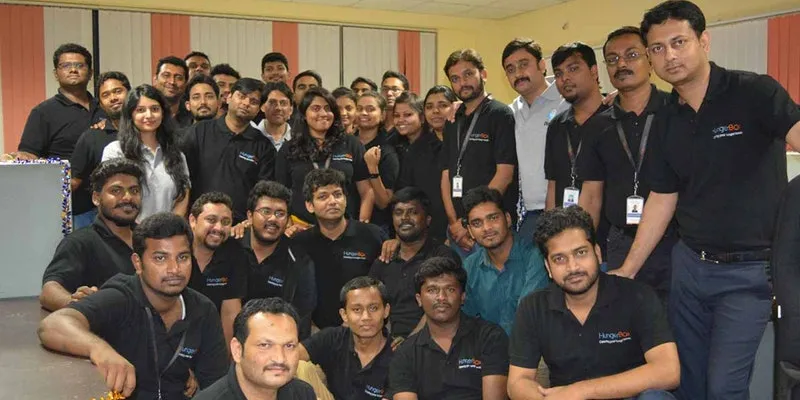How this Paytm-backed startup processed 50M transactions in the B2B food space
Backed by Kris Gopalakrishnan and Growth Story, Bengaluru startup HungerBox has over 125 institutional clients, and has recorded food sales worth Rs 500 crore in FY19.
Indian office-goers end up consuming at least two of their meals at the workplace. But with changing consumption patterns, work demands, and tech advancements, we hardly take a dabba from home, since it more convenient to order out. Or, there is always the office canteen to fall back on. But both these options involve sacrificing productive time to either deciding what to order or waiting in long queues at the cafeteria.
This is when former JustEat.in (acquired by ) Founder Sandipan Mitra, and its National Sales Head Uttam Kumar discovered “a tremendous whitespace opportunity for a tech-led, disruptive solution that addresses the B2B institutional food space”.
The duo co-founded , an institutional B2B2C foodtech startup in 2016. Headquartered in Bengaluru, HungerBox is an ISO 27001 certified company that connects suppliers to corporate clients, adding value to the B2B foodtech chain.

Sandipan Mitra (L) and Uttam Kumar, the Co-Founders of HungerBox.
Online food business experts
Co-founder and CEO Sandipan, 38, is an MBA graduate from Xavier Institute of Management and Entrepreneurship. After working with multinational companies including Yahoo, ITC, and Wipro, Sandipan took the entrepreneurial plunge to start up online food ordering portal JustEat.in, which was later acquired by Ola’s food vertical, Foodpanda.
After serving as Foodpanda’s Director of Corporate Sales and Marketing for a short stint, Sandipan co-founded HungerBox, along with his batchmate and former Kotak Mahindra Bank employee Uttam. Uttam, 37, was the National Sales Head at JustEat.in and served as the National Sales Head at Foodpanda before co-founding HungerBox. He is also the COO at the startup.
“When it comes to engaging in an activity two to three times a day throughout the week, people still queue up. We wanted to solve this pain-point using a tech-based solution,” Sandipan says.
Since inception, HungerBox has processed over 50 million transactions across 18 cities. It serves more than 125 clients in sectors including IT services, retail, healthcare, manufacturing, aviation, and financial services.
HungerBox’s clientele includes , Capgemini, , Wipro, , , Tata Motors, ABB, BIAL, mPhasis, and Lowe’s. It has also forayed into large segments such as mall food courts, tech parks, education institutions, hospitals, and multiplexes.
It has partnered with Krispy Kreme, Wow Momo, KFC, Domino’s, MOD, Paradise Biryani, US Pizza, Faasos, Eat.fit, GrowFit, and Freshmenu, as food vendors.
“We count 10 out of 11 of the biggest MNCs in India as our clients and have annuity contracts of three to five years,” Sandipan says. HungerBox’s first client was FirstSource, which it acquired back in September 2017.
The startup has so far raised $15 million from investors, including , Sabre Capital, Lionrock Capital, Neoplux and Infosys Founder Kris Gopalakrishnan. It is promoted by K Ganesh and Meena Ganesh’s Growth Story.
HungerBox employs up to 2,000 people across the country.

Team HungerBox
How does the platform work?
“Our main aim is to enhance the whole cafeteria experience for employees, and serve as a one-stop solution to the facilities and admin team and enable food vendors to eliminate cash pilferage,” says Sandipan.
The startup has partnered with thousands of food vendors across 18 cities. These vendors not just master in different cuisines, but also in variations like combo meals, snacks, juices and chats, and tuck shops. HungerBox ensures that all the food vendor partners comply with the startup’s ISO-certified auditors.
The employee app enables client employees to view the live-menu, order food from the desk, do express checkout, and provide multiple payment options. The custom-built POS machines act as a secure transaction medium between the employee and its service. The admin dashboard is meant for the facilities or admin teams to view detailed reports and track the cafeteria’s operations in real time. Finally, the Supervisor app helps supervisors monitor the day-to-day operations and daily activities of the site.
Using its artificial intelligence (AI) based tech platform, HungerBox deployed 28 different tech products, connecting these food vendors with employees of the client company.
HungerBox’s technology offerings include pre-ordering, live order tracking, feedback management, cafeteria density tracking, and it also enables digital payments.
The app provides personalised recommendations to employees to track calorie consumption, and also enables group-ordering. Additionally, HungerBox enables employees to order from restaurants in the vicinity of workplaces, when the corporate cafes are closed.
The B2B food business
HungerBox employs a commission-based model that is charged on the Gross Food Value (GFV) sold by its food vendor partners.
“We work with food service businesses to address inefficiencies in their operations, enhance quality and food safety, assisting them with finance to grow their businesses,” Sandipan says.
Commissions are typically 10 percent. In FY2019, HungerBox is currently at an ARR of Rs 528 crore, growing 3.5 times over last year. It closed at Rs 143 crore in FY 2018.
Sandipan says, “We are sharply focused on unit economics at a cafeteria level. We operate at a 48 percent gross margin at the cafeterias. However, we look forward to improving the gross margins. In a steady-state business, we could take these up to 68 percent.”
Market overview and future plans
According to a report by FICCI, Indian Food Services Industry: Engineer for Economic Growth and Employment, the size of the Indian food services market in India, both organised and disorganised, was estimated at Rs 337.5 billion in 2017, and was projected to grow at CAGR of 10 percent, to reach Rs 552 billion by 2022.
Other players addressing the institutional B2B food space include Sodexo and Elior. More recently, Zomato has also entered the space, with its Food@Work segment. However, Sandipan believes that HungerBox has a differentiator to offer.
“Our platform consolidates demand on one hand, and dovetails the preparation and supply of food in a dynamic and efficient manner, eliminating leakages and minimising food wastage,” he says.
Going ahead, HungerBox plans to expand operations to 10 more Indian cities, within the next 12 months. “We are looking to raise $25 million in the next six to eight months,” Sandipan adds.
HungerBox is also keen on foraying to the Southeast Asian market, and expects to reach one million daily orders in the next few months.
(Edited by Evelyn Ratnakumar)



![[Startup Bharat] From two orders a day to 150: meet HungerBay, the Zomato of Sikkim](https://images.yourstory.com/cs/2/3fb20ae0-2dc9-11e9-af58-c17e6cc3d915/Team_HungerBay1564071035504.png?fm=png&auto=format&h=100&w=100&crop=entropy&fit=crop)





